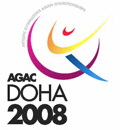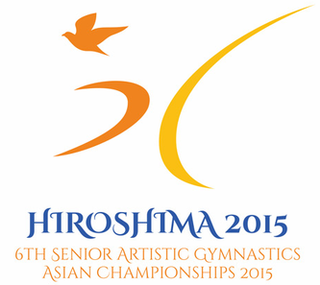At the 2004 Summer Olympics in Athens, Greece, three disciplines of gymnastics were contested: artistic gymnastics, rhythmic gymnastics and trampoline. The artistic gymnastics and trampoline events were held at the Olympic Indoor Hall and the rhythmic gymnastics events were held at the Galatsi Olympic Hall.

At the 2008 Summer Olympics, three gymnastics disciplines were contested: artistic gymnastics, rhythmic gymnastics and trampoline. The artistic gymnastics events were held at the Beijing National Indoor Stadium on August 9–19. The rhythmic gymnastics events were held at the Beijing University of Technology Gymnasium on August 21–24. The trampoline events were also held at the Beijing National Indoor Stadium on August 16–19.
Ri Se-gwang is a retired North Korean artistic gymnast, representing the April 25 Sports Club. He is often considered a specialist on vault apparatus in the sport of men’s artistic gymnastics (MAG).

Ksenia Dmitrievna Afanasyeva is a retired Russian artistic gymnast who competed at the 2008 and 2012 Summer Olympics. She is the 2011 world champion on floor exercise, the 2013 and 2015 European floor champion, and the 2013 Universiade vault and floor champion. Widely regarded as one of the most original and artistic gymnasts of all time, she retired from elite gymnastics in July 2016 due to kidney disease, a month away from the 2016 Summer Olympics, for which she was the Russian team's first alternate.
Ashish Kumar is an Indian gymnast from Allahabad, who won India's first-ever medals in gymnastics, in October 2010 at the 2010 Commonwealth Games and became the most successful Indian gymnast in Commonwealth Games history, by winning bronze and silver medals in different gymnastic events.
Gymnastics at the 2010 Asian Games was held at the Asian Games Town Gymnasium in Guangzhou, China from November 13 to 26, 2010.

The 2011 World Artistic Gymnastics Championships were held in Tokyo, Japan, from October 7–16, 2011, at the Tokyo Metropolitan Gymnasium. Due to uncertainty over the nuclear situation following the 2011 Tōhoku earthquake and tsunami, the International Federation of Gymnastics revealed it was considering moving the event, but on May 22 FIG president Bruno Grandi announced that the World Championships would take place in Tokyo as planned.

The 2002 Asian Games was a multi-sport event held in Busan, South Korea from September 29 to October 14, 2002. Busan was the second South Korean city to host the Games, after Seoul in 1986. A total of 6,572 athletes—4,605 men and 1,967 women—from 44 Asian National Olympic Committees (NOCs) participated in 38 sports divided into 419 events. The number of competing athletes was higher than the 1998 Asian Games, in which 6,544 athletes from 41 NOCs participated. It was the first time in the history of the Asian Games that all 44 member nations of the Olympic Council of Asia (OCA) participated in the Games. Afghanistan returned after the fall of the Taliban government in the midst of ongoing war; East Timor, newest member of the OCA made its debut; and North Korea competed for the first time in an international sporting event hosted by South Korea. Both nations marched together at the opening ceremony with a Korean Unification Flag depicting the Korean Peninsula as United Korea.

The 1974 Asian Games was a multi-sport event held in Tehran, Iran from September 1, 1974, to September 16, 1974. This was the first time that Asian Games were celebrated in any Middle East country. A total of 3,010 athletes selected from 25 Asian National Olympic Committees participated in 16 sports divided into 202 events. The number of participating countries was the greatest in Asian Games history, eighteen nations competed in Bangkok, host of the 1970 Asian Games. Fencing, gymnastics (artistic) and women's basketball were included for the first time; while sailing—which made its debut in the previous Asian Games—was not included, however since 1978, sailing is a part of the Asian Games sports.
Gymnastics was contested at the 1974 Asian Games, held in Tehran, Iran from September 1, 1974, to September 16, 1974. It was the first time that gymnastics was included as the medal sport in the Asian Games, and only artistic events were contested. In the Games, only four participating National Olympic Committees (NOCs) succeeded in winning any medal. China lead the medal table, with overall 18 medals, Japan finished second with four gold, and total nine medals. South Korea, although won only four total medals but its two gold helped it to clinch third position in final standings, while North Korea with one gold and 11 overall medals finished last.
Three gymnastics disciplines were contested at the 2012 Olympic Games in London: artistic gymnastics, rhythmic gymnastics and trampolining. The trampoline events were held at the North Greenwich Arena from 3 to 4 August; the artistic events were also held at the North Greenwich Arena, from 28 July to 7 August. The rhythmic gymnastics events took place at Wembley Arena from 9 to 12 August.

Gymnastics at the 2016 Summer Olympics in Rio de Janeiro was held in three categories: artistic gymnastics, rhythmic gymnastics and trampolining. All gymnastics events were staged at the Arena Olímpica do Rio from 6 to 21 August 2016.

The 2008 Asian Artistic Gymnastics Championships were the 4th edition of the Asian Artistic Gymnastics Championships, and were held in Doha, Qatar from November 15 to November 18, 2008.

The 2006 Asian Artistic Gymnastics Championships were the 3rd edition of the Asian Artistic Gymnastics Championships, and were held in Surat, India from 30 July to 3 August 2006.
The 2003 Asian Artistic Gymnastics Championships were the 2nd edition of the Asian Artistic Gymnastics Championships, and were held in Guangzhou, China from November 22 to November 25, 2003.
The Asian Gymnastic Union (AGU) organizes Asian Gymnastics Championships for each of the FIG gymnastic disciplines: men's and women's artistic gymnastics, rhythmic gymnastics, acrobatic gymnastics, aerobic gymnastics and trampoline gymnastics. This article lists only the senior editions of the Asian Gymnastics Championships, in which competitors must be over 16 years of age. Specific editions of the Asian Championships also exist for junior athletes; for example, the first edition of the Junior Asian Artistic Gymnastics Championships was held in 1971, but the first senior edition of the tournament was only held in 1996. Similarly, Junior Asian Trampoline Championships were held in 2010 and 2012, but only in 2014 the Asian Gymnastics Union held a senior tournament in conjunction with the junior championships for the first time.

Gymnastics at the 2020 Summer Olympics in Tokyo was held in three categories: artistic gymnastics, rhythmic gymnastics and trampolining. All gymnastics events were staged at the Olympic Gymnastic Centre, Tokyo in 2021.

The 2015 Asian Artistic Gymnastics Championships were the 6th edition of the Asian Artistic Gymnastics Championships, and were held in Hiroshima, Japan from July 31 to August 2, 2015.
Shek Wai Hung is an artistic gymnast from Hong Kong. He is the current Asian Games champion on vault.
The 2017 Asian Artistic Gymnastics Championships was the 7th edition of the Asian Artistic Gymnastics Championships, and were held in Bangkok, Thailand from 18 May to 21 May 2017.










